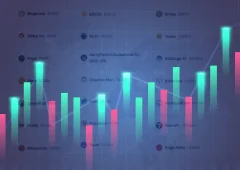BlackRock’s Bitcoin ETF Sees $597 Million Inflow Amid Crypto Market Struggles
08.01.2025 15:30 1 min. read Kosta Gushterov
BlackRock’s iShares Bitcoin ETF (IBIT) saw a significant $597 million inflow on Tuesday, providing a much-needed boost to the struggling crypto market.
This came at a time when investor sentiment had turned cautious following strong economic data from the US, including the JOLTS job openings and ISM Services PMI reports.
Despite a broader market downturn, BlackRock’s Bitcoin ETF stood out with impressive inflows, while other prominent Bitcoin ETFs such as those from Fidelity, Bitwise, Ark Invest, Franklin Templeton, and Grayscale experienced outflows. On January 7, IBIT alone acquired 6,078 BTC, valued at $208.7 million, significantly outpacing the 450 BTC mined by miners that day.
The ETF’s continued success is notable, marking its third consecutive inflow despite a recent selloff. This followed a $978.6 million inflow on Monday, which had sparked renewed optimism as Bitcoin surged past the $102K mark.
In contrast, Bitcoin ETFs from other major players faced withdrawals: Fidelity’s FBTC saw $86.29 million in outflows, Bitwise’s BITB had $113.85 million, and Ark Invest’s ARKB recorded $212.55 million in outflows. Franklin Templeton’s EZBC and Grayscale’s GBTC also saw significant outflows, at $5.58 million and $125.45 million, respectively.
Overall, the net inflow for Bitcoin spot ETFs reached $52.4 million, with BlackRock’s iShares Bitcoin Trust accounting for the majority of this figure.
-
1
Crypto Inflows hit $1B Last Week as Ethereum Outshines Bitcoin in Investor Sentiment
07.07.2025 20:30 2 min. read -
2
Bitcoin: Is the Cycle Top In and How to Spot It?
09.07.2025 16:00 2 min. read -
3
Public Companies Outpace ETFs in Bitcoin Buying: Here is What You Need to Know
02.07.2025 12:30 2 min. read -
4
Robert Kiyosaki Buys More Bitcoin, Says He’d Rather Be a ‘Sucker Than a Loser’
02.07.2025 22:00 1 min. read -
5
This Week in Crypto: Whale Accumulation, Ethereum Signals, and a Sentiment Shake-Up
05.07.2025 21:00 3 min. read
Over $5.8 Billion in Ethereum and Bitcoin Options Expired Today: What to Expect?
According to data shared by Wu Blockchain, over $5.8 billion in crypto options expired today, with Ethereum leading the action.
IMF Disputes El Salvador’s Bitcoin Purchases, Cites Asset Consolidation
A new report from the International Monetary Fund (IMF) suggests that El Salvador’s recent Bitcoin accumulation may not stem from ongoing purchases, but rather from a reshuffling of assets across government-controlled wallets.
Ethereum Sparks Altcoin Season as FOMO Shifts Away From Bitcoin
Traders are rapidly shifting their focus to Ethereum and altcoins after Bitcoin’s recent all-time high triggered widespread retail FOMO.
BSTR to Launch With 30,021 BTC, Becomes 4th Largest Public Bitcoin Holder
BSTR Holdings Inc. is set to become the fourth-largest public holder of Bitcoin, announcing it will launch with 30,021 BTC on its balance sheet as part of its public debut.
-
1
Crypto Inflows hit $1B Last Week as Ethereum Outshines Bitcoin in Investor Sentiment
07.07.2025 20:30 2 min. read -
2
Bitcoin: Is the Cycle Top In and How to Spot It?
09.07.2025 16:00 2 min. read -
3
Public Companies Outpace ETFs in Bitcoin Buying: Here is What You Need to Know
02.07.2025 12:30 2 min. read -
4
Robert Kiyosaki Buys More Bitcoin, Says He’d Rather Be a ‘Sucker Than a Loser’
02.07.2025 22:00 1 min. read -
5
This Week in Crypto: Whale Accumulation, Ethereum Signals, and a Sentiment Shake-Up
05.07.2025 21:00 3 min. read


